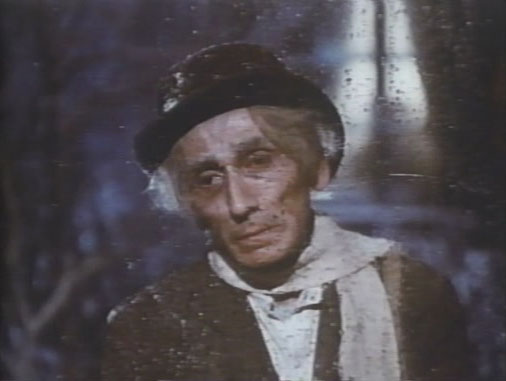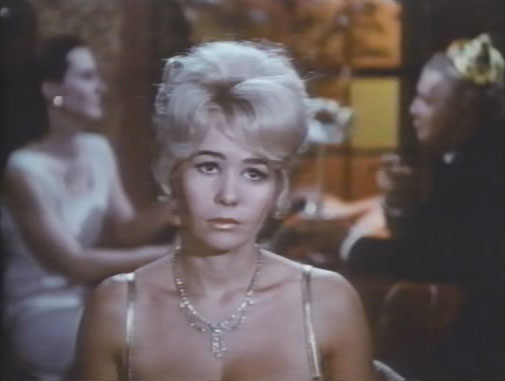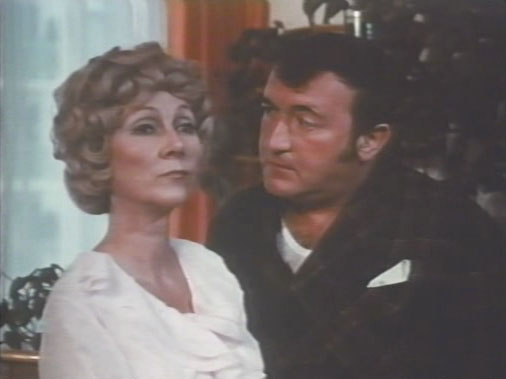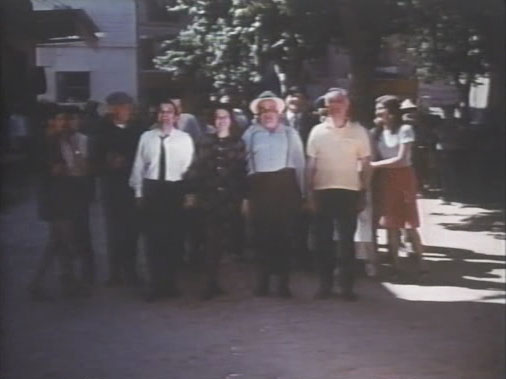A very late entry for…

Initiated by Shadowplay
Le final film de Jean Renoir, made for television when the director was in his mid-70’s, eight years after his last theatrical picture The Elusive Corporal. Some tinges of bitterness, of sadness and despair, but as always Jean is finally generous and life-affirming, closing with a whole town roaring laughter, making me laugh in response.
But first, Renoir minimizes expectations. Away from the monumental cinema screen (which he often conflated with a theatrical stage), now working for television, he envisions a diminished stage, a tiny theater, and so presents short stories instead of one long work.

A rich loudmouth (Roland Bertin of The Model Couple, The Hairdresser’s Husband), in a move imitated by Lars Von Trier for The Five Obstructions, pays a homeless guy to watch his friends’ Christmas feast through the restaurant window. Some of his guests are bummed, so they flit off elsewhere, leaving this guy outside making restaurant patrons nervous until the maitre d’ pays him in food and wine to buzz off. The bum (Nino Formicola) brings the food to his girlfriend (singer Milly, in The Conformist the same year) under a bridge – they celebrate the holiday talking together (but not eating) then lie down and freeze to death with happy smiles on their face. A weird holiday fable, and a circular one for Renoir, who’d filmed The Little Match Girl (with much window gazing and freezing to death) over forty years prior.
Gaze from outside:

Gaze from inside:

As with the concept of the “petit theater” itself, the next episode can be seen as a cranky old-timer’s refusal to accept modern technology, but in both cases he suffuses his premise with humor, downplaying the crankiness in favor of amusement. It’s the most comedic and musical of the pieces, featuring a Greek choir of townsfolk, a painting that changes expression, and cartoonishly fun acting.
Marguerite Cassan (my favorite actor of the same year’s La Rupture – mother of the husband-gone-mad) wants only an electric floor buffer, and bullies her husband about it until the next-door neighbor, an electric floor buffer sales rep, overhears and comes over to demo the product. Unfortunately, Cassan’s poor husband (Pierre Olaf of Camelot) slips on the ultra-smooth floor and dies. She remarries a man with a stronger will (Jacques Dynam, who played buffoon inspector Juve’s second-in-command in the 1964 Fantomas) who insists she not run the machine while he’s home. She disobeys and he hurls it out the window, so she hurls herself out the window. That’s two Renoir stories in a row that end in demise.
M. Cassan giving the silent treatment to first husband:

M. Cassan giving the silent treatment to second husband:

Part Three is a musical interlude featuring Jeanne Moreau (the same year she was/wasn’t in Orson Welles’s The Deep) singing “When Love Dies.” Incredibly, the producers of the VHS copy I watched decided not to subtitle the song.

The final segment was my favorite. Duvallier (Fernand Sardou), a well-loved retired captain, resides happily in his big house with his young wife (Francoise Arnoul, lead girl in French Cancan) and a lovestruck maid (the rarely seen Dominique Labourier, a few years before starring in Celine and Julie Go Boating), spending his days in town playing bowls (a similar game to bocce). All is bliss until the wife is discovered to be sleeping with a friend of his, then it’s tears all around. Duvallier ponders the situation, asking townsfolk for advice, while the friend first decides to leave town (him: “He loves you”, Mrs. Duvallier: “Yes, but only when I’m happy. When I’m unhappy I upset him, and if you leave I’ll be unhappy.”) then proposes a duel. But Duvallier decides it’s best for everyone to stay happy, to live as they have been, and so the trio goes into town for a game of bowls. It’s the most cheerful movie about infidelity that I’ve ever seen.
Final bow:

